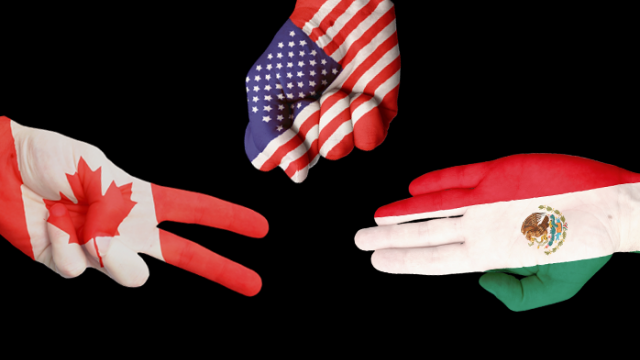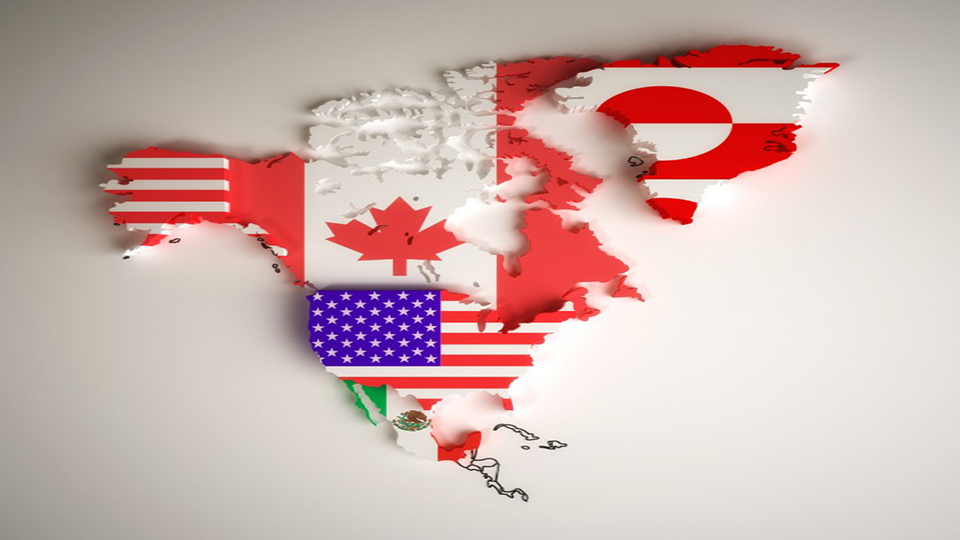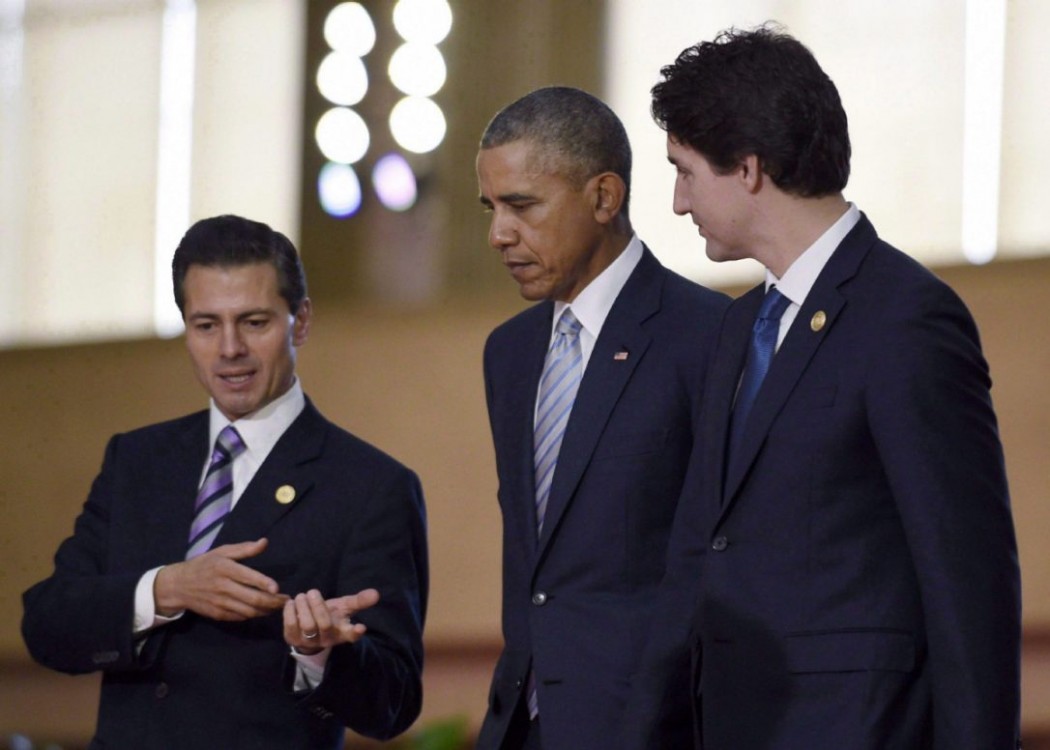
When the NAFTA nations – United States, Canada and Mexico – meet Wednesday for the annual Three Amigos Summit in Ottawa, climate change and clean energy are expected to dominate the agenda. However, a curiously timed $15 billion lawsuit launched last Friday by TransCanada, which is using NAFTA to sue the U.S. government for its rejection of the Keystone XL pipeline, has undercut the very same climate ideals professed by the North American nations.
Under the Investor-State Dispute Settlement (ISDS) agreement contained in NAFTA, foreign corporations have a right to take national governments to court if they feel policies or regulations have in any way infringed on their capacity to profit. In January, two months after President Obama formally rejected the Keystone pipeline, TransCanada filed a Notice of Intent to sue the U.S. under Chapter 11 of NAFTA, dubbing the suit "TransCanada Corporation and TransCanada Pipelines Limited v. The Government of the United States of America."
On June 24, it made good on that promise by submitting a formal Request for Arbitration, setting the legal process in motion just as the three NAFTA nations prepared to meet to discuss a range of climate initiatives. For many, the irony was hard to miss.
"We have the three countries getting together that created NAFTA talking about how important it is to address climate change, while their major economic treaty is being used by a transnational to undermine the U.S. climate agenda that rejected the Keystone XL pipeline," said Jesse Swanhuyser, a lawyer with the Center for International Environmental Law, which is fighting TransCanada's suit in coordination with Sierra Club, Greenpeace, Earthjustice, Friends of the Earth and other organizations.
"We see the TransCanada case as a critical piece in addressing the conflict between the ISDS system that allows transnational corporations to undermine democratically supported initiatives, and the imperative of addressing climate change. By rejecting the pipeline we’re hopefully leaving oil in the ground and highlighting the importance of moving to a low-carbon economy," he added.
But, "if what we’re going to have to do is pay billions to the energy companies every time countries make these decisions, it could entirely unravel governments' ability to address climate change, [so] the ISDS system is in direct conflict with the climate imperative."
Rise of the Corporate Tribunal
Cases of corporations suing governments over policies or regulations that they claim inhibit their ability to profit have skyrocketed in recent years: Just 50 such cases were launched during the first three decades that the ISDS structure existed, but between 2011-13, corporations initiated 50 of these kinds of cases each year, with 42 launched in 2014. According to Public Citizen, "If a tribunal rules against a challenged policy, there is no limit to the amount of taxpayer money that the tribunal can order the government to pay the foreign corporations... based on the 'expected future profits.'"
A few examples over the past 20 years:
• In 2012, the Swedish energy giant Vattenfall sued German taxpayers for $5 billion over the country's decision to phase out nuclear power following the Fukushima disaster, which the company claimed caused it to lose profit. (The decision is still pending).
• In 2006, Occidental Petroleum sued Ecuador for $2.3 billion, and won, after the government cancelled an oil concession due to the U.S. oil corporation's prior breach of Ecuadorian law.
• In 1997, the U.S. waste management firm Metalclad Corporation sued the Mexican municipality of Guadalcazar for $16.2 million, and won, after being denied a construction permit to expand a toxic waste facility amid concerns of water contamination and other health and environmental hazards.
• Also in 1997, the U.S. chemical company Ethyl Corporation launched a successful ISDS case under NAFTA against Canada for its ban of MMT, a carcinogenic gasoline additive used to improve engine performance. Canada not only paid the company $13 million in damages and legal fees, but the MMT ban was overturned as a result.
The list goes on. But for Swanhuyser and his allies in the climate and environmental law movement, the buck stops with TransCanada.
“TransCanada is claiming that the Obama Administration violated special rights granted to it under NAFTA because the review and rejection of the Keystone XL pipeline was too politicized. [But] NAFTA does not protect TransCanada from the challenges created when grassroots organizations decide that the impacts of a project will harm the climate," he said.
In this case, his group and others are allying with the State Department because, as Swanhuyser said, "we all want the same outcome, which is to send TransCanada packing." But the alliance won't likely to last long, he suggested, because ultimately the camps have very different interests.
"The State Department is also the place that promotes these investment agreements that create these tribunals. We all want TransCanada to lose, but we have much longer term goals to undermine or reform the way these tribunals function. The State Department wants to preserve [how they function]."
Setting a Precedent for TPP
TransCanada's decision to oppose the popular American will and the global urgency to address climate change reflects not only the perils of NAFTA but, more worryingly, the vastly larger Trans-Pacific Partnership and its sister agreement, the Transatlantic Trade and Investment Partnership.
According to the Sierra Club report, "Climate Roadblocks: Looming Trade Deals Threaten Efforts to Keep Fossil Fuels In the Ground":
"Like NAFTA, the TPP and TTIP would give foreign corporations broad rights, including the right to challenge new fossil fuel restrictions that thwart their 'expectations' for a stable business environment... law firms specializing in ISDS are now explicitly advising corporations, including fossil fuel firms, to see ISDS as a 'tool' to 'prevent' unwanted policies, as threats of ISDS can chill policy proposals."
The report claims that, if enacted, the TPP would double the number of corporations that could follow TransCanada's lead in challenging U.S. health and environmental regulations through the use of these privately selected and unaccountable tribunals. Michael Brune, Sierra Club's executive director, wrote this week, "TransCanada’s attempt to make American taxpayers hand over more than $15 billion because the company’s dirty Keystone XL pipeline was rejected shows exactly why NAFTA was wrong and why the even more dangerous and far-reaching Trans-Pacific Partnership must be stopped in its tracks."
Under the TPP, which is still being debated in Congress, foreign corporations could challenge U.S. restrictions on oil drilling, fracking, and other activities that harm human and environmental health. According to Swanhuyser, the design and structure of the TPP, especially regarding ISDS tribunals, narrowly aligns with NAFTA.
"NAFTA continues to be the blueprint on which all subsequent free trade agreements are built – the way you take blueprints for two houses, you add a window or change a garage, but at end of the day it’s the same structure. The starting point for TPP was exactly the same structure that NAFTA provided. You can call it a partnership or a trade deal, but the large-scale economic outcomes are going to be the same," he said, and "in terms of the ISDS language, it’s almost taken verbatim. The TPP language is in no meaningful way different from NAFTA."
People Conquered a Pipeline
Long-term climate goals of the U.S., Canada and Mexico include establishing a North American target to reduce methane emissions, developing a common approach to carbon pricing, and speeding the continent's shift to clean energy. But it's unlikely that any significant agreements or breakthroughs will come out Wednesday's meeting in Ottawa.
On the contrary, TransCanada's lawsuit has revealed now, perhaps more than ever, the degree to which NAFTA nations make and enforce laws explicitly suited for corporate gain – not communities, the environment or the global climate.
"This case demonstrates in stark terms why individuals and groups from across the political spectrum view so-called 'free trade' – from NAFTA to the Trans-Pacific Partnership – with tremendous skepticism,” said Swanhuyser. But regardless of the outcome in the suit, he added, the people's victory against Keystone still stands.
"Let’s say we lose this case badly: the tribunal rules for TransCanada on every single ground, says the U.S. acted arbitrarily and gives them $15 billion, the maximum amount of damages. They still don’t get to build the pipeline. We have won in terms of keeping the pipeline from being built."
3 WAYS TO SHOW YOUR SUPPORT
- Log in to post comments



















Comments
Ken Bachtold replied on
TPP
With the disastrous NAFTA as an example, how can any reasonable person, let alone an honest politician endorse TPP (take note Hillary Clinton, who call TPP the "gold standard of trade deals". OMG!!!!!
Rudya replied on
TPP
Clinton will sign the TPP. It may be modified at its edges, its name may change, but as sure as night follows day, Clinton will sign.
Larry replied on
The TPP is the Road to Serfdom Under Global Corporate Feudalism
Check out the World Economic Forum's "Global Redesign Initiative". It's a blueprint for multi-national corporations to elevate themselves to the status of the nation-state. Any politician advocating for the adoption of the TPP is consigning us to another Dark Ages. If you're not among the .01%, .001% or the .0001%, you will be a modern-day serf, like the rest of us. Remember the "Hunger Games"? A portal into the future the TPP portends.